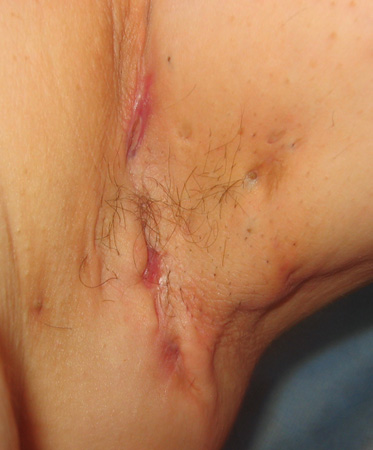Complications
Chronic inflammation is a risk factor for developing squamous cell carcinoma (SCC). Patients with long-standing severe HS are more likely to develop SCC, particularly in the perianal and inguinal areas. This occurs more often in men. The average duration of symptomatic HS in patients who develop SCC is 25 years. Careful examination of draining and ulcerated lesions is critical for early identification and treatment.[79][80]
Chronic inflammation can lead to scarring of the lymphatics and lead to poor drainage of local interstitial fluid, leading to lymphoedema. Aggressive treatment is important to avoid this outcome. Once lymphoedema is present, treatment is difficult. Referral to physiotherapy for possible compression therapy may be considered.[79]
Severe HS may leave residual scars in previously involved areas. [Figure caption and citation for the preceding image starts]: Hidradenitis suppurativa: linear scarsFrom R.A. Lee, MD, PhD [Citation ends].
Localised infection is common. Development of drug-resistant organisms is likely with long-term antibiotic use. Serial bacterial cultures are useful, particularly when there is an unexpected flare of the disease.
Use of this content is subject to our disclaimer